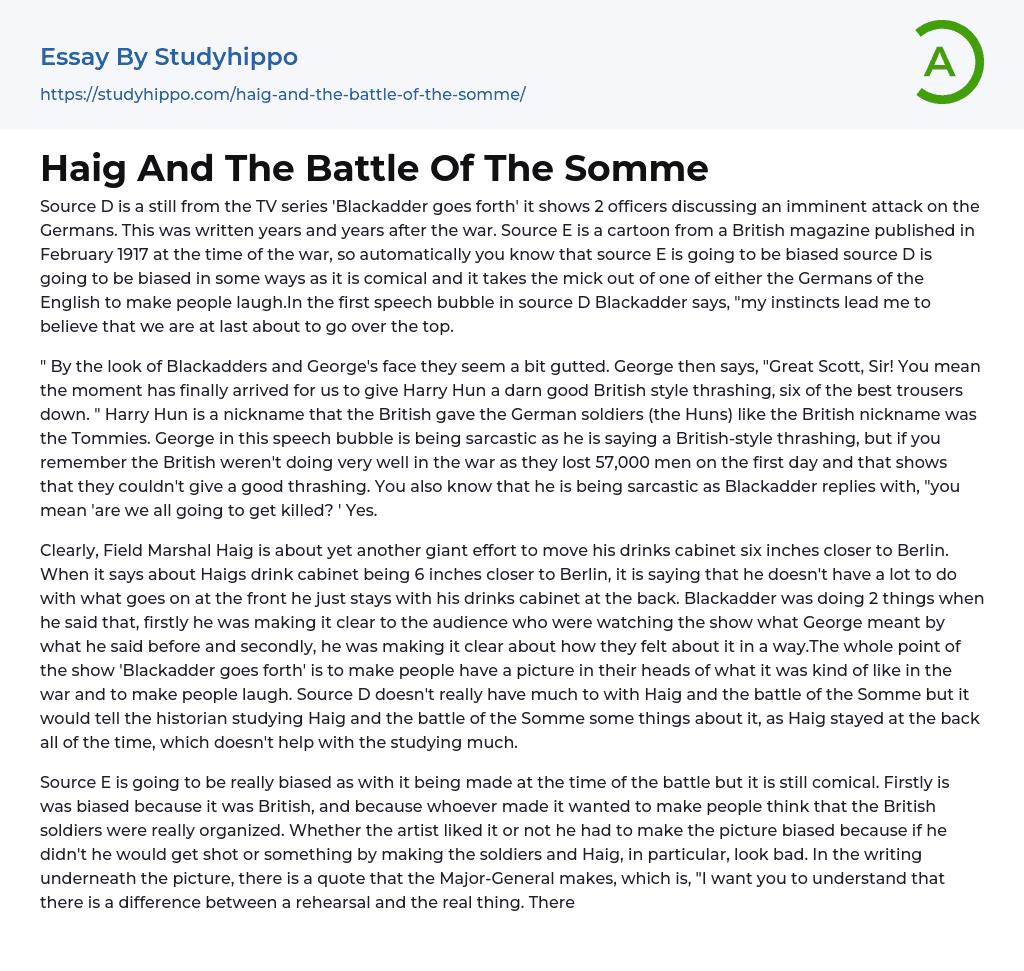Source D is a still from the TV series 'Blackadder goes forth' it shows 2 officers discussing an imminent attack on the Germans. This was written years and years after the war. Source E is a cartoon from a British magazine published in February 1917 at the time of the war, so automatically you know that source E is going to be biased source D is going to be biased in some ways as it is comical and it takes the mick out of one of either the Germans of the English to make people laugh.In the first speech bubble in source D Blackadder says, "my instincts lead me to believe that we are at last about to go over the top.
" By the look of Blackadders and George's face they seem a bit gutted. George then says, "Great Scott, Sir! Yo
...u mean the moment has finally arrived for us to give Harry Hun a darn good British style thrashing, six of the best trousers down. " Harry Hun is a nickname that the British gave the German soldiers (the Huns) like the British nickname was the Tommies. George in this speech bubble is being sarcastic as he is saying a British-style thrashing, but if you remember the British weren't doing very well in the war as they lost 57,000 men on the first day and that shows that they couldn't give a good thrashing. You also know that he is being sarcastic as Blackadder replies with, "you mean 'are we all going to get killed? ' Yes.
Clearly, Field Marshal Haig is about yet another giant effort to move his drinks cabinet six inches close
to Berlin. When it says about Haigs drink cabinet being 6 inches closer to Berlin, it is saying that he doesn't have a lot to do with what goes on at the front he just stays with his drinks cabinet at the back. Blackadder was doing 2 things when he said that, firstly he was making it clear to the audience who were watching the show what George meant by what he said before and secondly, he was making it clear about how they felt about it in a way.The whole point of the show 'Blackadder goes forth' is to make people have a picture in their heads of what it was kind of like in the war and to make people laugh. Source D doesn't really have much to with Haig and the battle of the Somme but it would tell the historian studying Haig and the battle of the Somme some things about it, as Haig stayed at the back all of the time, which doesn't help with the studying much.
Source E is going to be really biased as with it being made at the time of the battle but it is still comical. Firstly is was biased because it was British, and because whoever made it wanted to make people think that the British soldiers were really organized. Whether the artist liked it or not he had to make the picture biased because if he didn't he would get shot or something by making the soldiers and Haig, in particular, look bad. In the writing underneath the picture, there is a quote that the Major-General makes, which is, "I want you to
understand that there is a difference between a rehearsal and the real thing. There are three essential differences: first, the absence of the enemy," he then turns to the Regimental Sergeant Major, "what is the second difference? " he replies by saying, "the absence of the General, Sir.
" This cartoon gives the basic idea of what it was like in a rehearsal. For example, it explains that the General doesn't get involved with a real attack, and it shows how the men are dressed and organized. Source E would only tell a historian who is studying Haig and the battle of the Somme that the General is absent during an attack which isn't really much use. From the information that I have got, even though both sources aren't really on about Haig and the Somme, the information gives you a very basic idea of how things worked, I would say that source D doesn't give any good information for a historian on the battle of the Somme.
Source E shows that the Generals were cowards because they wouldn't fight and they stayed about 20 miles behind the trench. I wouldn't say that either of the sources is very useful to a historian studying Haig and the battle of the Somme.




